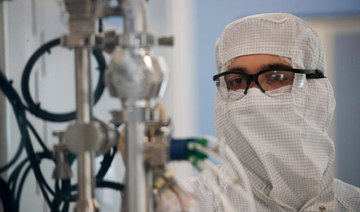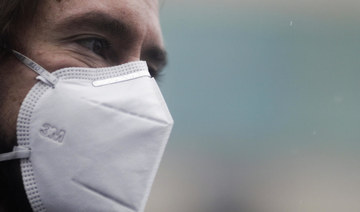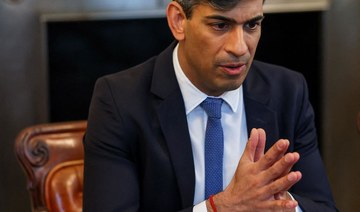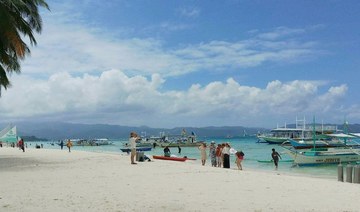SAO PAULO: Brazilian President Jair Bolsonaro on Wednesday rejected the announced purchase of 46 million doses of a potential vaccine against the coronavirus being developed by a Chinese company and tested in a state governed by a political rival, prompting some to question if he was allowing politics to steer public health decisions.
“The Brazilian people will not be anyone’s guinea pig,” Bolsonaro said on his social media channels, adding that the vaccine has not yet completed testing, which is the case with all potential vaccines for the virus. “My decision is to not purchase such a vaccine.”
Health Minister Eduardo Pazuello had announced the purchase Tuesday in a meeting with Sao Paulo Gov. João Doria, a foe of Bolsonaro’s whose state is participating in the vaccine’s development through its Butantan Institute. The cost of the acquisition was estimated at 2 billion reais ($360 million).
“Butantan’s vaccine will be Brazil’s vaccine,” Pazuello said.
A Brazilian Health Ministry document issued Monday and shared by Sao Paulo’s government Wednesday confirmed that the ministry had put in writing its intention to buy the doses of the “Butantan Vaccine-Sinovac/Covid-19” for an estimated price of $10.30 each.
The document made explicit the purchase was contingent upon the health regulator’s approval. Bolsonaro told journalists that protocol will be canceled.
Claudio Couto, a political science professor at Getulio Vargas Foundation, a university, felt the president’s move had little to do with the virus and was more a way to hurt Doria, who is widely cited as a likely challenger to Bolsonaro’s 2022 reelection bid.
“His concern is to be a strong candidate for reelection, and that often means giving trouble to his adversaries,” Couto said.
Bolsonaro and Doria have had an adversarial relationship since the start of the pandemic, with each taking opposite stances regarding stay-at-home recommendations and restrictions on activity. The governor, whose state is Brazil’s most populous, heeded the counsel of public health experts and adopted such measures, which the president blasted, arguing the economic fallout could kill more than the disease.
Brazil has confirmed more than 153,000 deaths from COVID-19, the second most in the world, behind only the US The South American nation has also reported 5.2 million confirmed cases of coronavirus infections, the world’s third highest tally.
“It isn’t ideology, it isn’t politics, and it isn’t the electoral process that saves. It is the vaccine,” Doria told reporters in the national capital, Brasilia.
During a brief news conference in the Sao Paulo countryside, Bolsonaro shot back at Doria, accusing the governor of playing politics by hurrying out a vaccine in an effort to buoy his popularity. The president also accused his adversaries, including Doria, of “promoting a narrative of terrorism since the start of the pandemic.”
Brazil has a long tradition of immunization programs. The South American country has a struggling, but universal public health care system, that has been key to stopping outbreaks of measles, yellow fever and other diseases.
Bolsonaro has said no one will be forced to get a coronavirus vaccine. But his comments Wednesday reflected particular skepticism of the vaccine being developed by Chinese pharmaceutical company Sinovac.
He has often expressed mistrust of the Asian power, which is Brazil’s biggest trading partner, particularly on the campaign trail in 2018. He called China “heartless” and said that under his watch it wouldn’t be allowed to buy up Brazil.
“THE CHINESE VACCINE OF JOÃO DORIA,” Bolsonaro wrote on social media Wednesday. ″For my government, any vaccine, before it is made available to the population, must be PROVEN SCIENTIFICALLY.″
Despite that nod to scientific rigor, Bolsonaro for months touted the healing powers of hydroxychloroquine even as studies indicated the anti-malarial drug was ineffective against the coronavirus and caused harmful side effects.
In June, Brazil’s government announced a deal with Oxford University and pharmaceutical company AstraZeneca to purchase 100 million doses of its potential coronavirus vaccine.
It has become common practice for governments to purchase doses of promising coronavirus vaccines, to build a stockpile in case they are proven effective. That investment is usually not refundable if the shot fails.
Earlier, the executive secretary of Brazil’s Health Ministry said in a televised statement that there had been a misunderstanding in the announcement about buying the CoronaVac vaccines.
“There is no intention to buy vaccines from China,” said Antonio Elcio Franco, who added there will be only “a Brazilian vaccine” made at the Butantan Institute in Sao Paulo. Those shots, however, would still be based upon Sinovac’s research.
At least two governors, including Flavio Dino in Maranhao state, said they would fight Bolsonaro’s administration if it refused authorization for a vaccine that works, whatever its provenance.
“We don’t want a new war,” said Dino, another adversary of the president. “Governors will go to Congress and to courts to ensure that the population has access to all vaccines that are efficient and safe. Health is a bigger asset than ideological or electoral disputes.”
Brazil's Bolsonaro rejects coronavirus vaccine from China
https://arab.news/5btde
Brazil's Bolsonaro rejects coronavirus vaccine from China
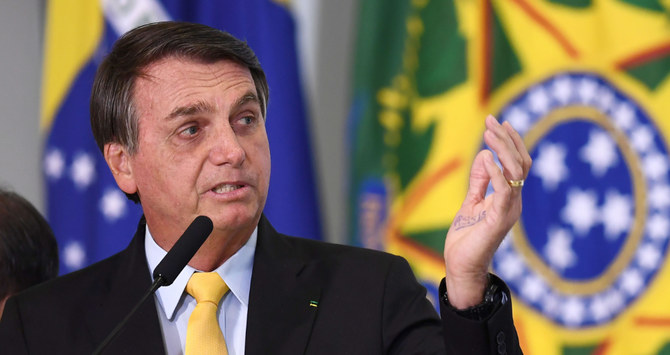
Syrian asylum-seeker plans suicide if sent to Rwanda
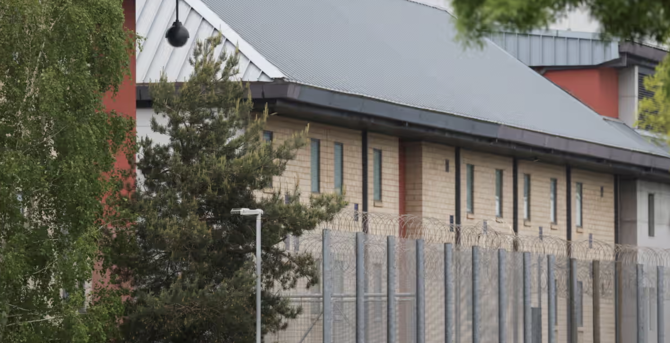
- Man identified as Khaled among more than 100 people set to be sent to East African country
- ‘I will not be safe in Rwanda. If they manage to send me there, I will kill myself on arrival’
LONDON: A Syrian asylum-seeker in the UK set to be deported to Rwanda has said he will kill himself if sent to the East African country.
The man, identified as Khaled, is being held at Colnbrook Immigration Removal Centre with a number of other people due to be sent to Rwanda.
He told The Guardian: “Everyone is so stressed in here because of Rwanda. We can’t eat and we can’t sleep. I was displaced in Syria for nine years and was imprisoned there and I was also detained and tortured in Libya.
“Being in detention is very triggering for me. What matters to asylum-seekers is to be safe. I will not be safe in Rwanda. If they manage to send me there, I will kill myself on arrival in that country.”
Khaled has been in the UK since 2022, and discovered he could be sent to Kigali for the first time in February 2023. He was detained with a view to removal last week.
“They arrested me and put me in handcuffs in a police cell. The same thing happened to two other people who were reporting — Iraqi Kurds. After we were taken out of the cell we were handcuffed again and taken in a van to the detention centre,” he said.
“I have been trying to see a doctor in the detention centre because of an infection in my leg I need antibiotics for but so far I haven’t managed to get an appointment.”
Another asylum-seeker who did not give his name, and who arrived in the UK from Sudan in 2022, told The Guardian that he had traveled via the Mediterranean and the boat he had been on almost sank.
“I would have been happy to claim asylum in Italy but Italian officials did not fingerprint me and told me to move on to France. There I was told it would be four years before they could consider my asylum claim so I waited in the jungle in Calais to cross to the UK. Crossing the Channel in an overcrowded boat was even more terrifying than crossing the Mediterranean,” he said.
“When I heard about the government’s plans to send asylum-seekers to Rwanda at the beginning of 2023 I was very frightened.
“I escaped from an African country because it was not safe and I am very scared to be deported to another African country because I know it will not be safe for me.
“I was arrested last week when I went to report in Newcastle. They didn’t mention Rwanda until I reached the detention centre and at first just said ‘We are deporting you to a safe third country.’”
The two men told The Guardian that they were struggling to contact legal representatives while in detention, with a seven-day deadline imposed by the Home Office for those wishing to appeal the decision to send them to Rwanda.
The charity Care4Calais has published data suggesting that of the more than 100 people detained to be sent to Rwanda, most come from war zones.
The charity’s head of legal access, Hannah Harwood, said: “The people detained have not had their asylum claims processed, and it’s clear from the first cohort we are in contact with that if their claims were processed they would probably be granted refugee status in the UK. It reaffirms how shameful the Rwanda plan is and why it must be stopped.”
A Home Office spokesperson said: “We take the welfare of people in our care extremely seriously. There are robust safeguarding measures in place to ensure everyone is treated with dignity and has the support they need.
“All detained individuals have access to a mobile phone, internet and landline telephones so they can keep in contact with friends, family and other support.”
Philippines seeks to position itself as top tourism destination at Arabian Travel Market
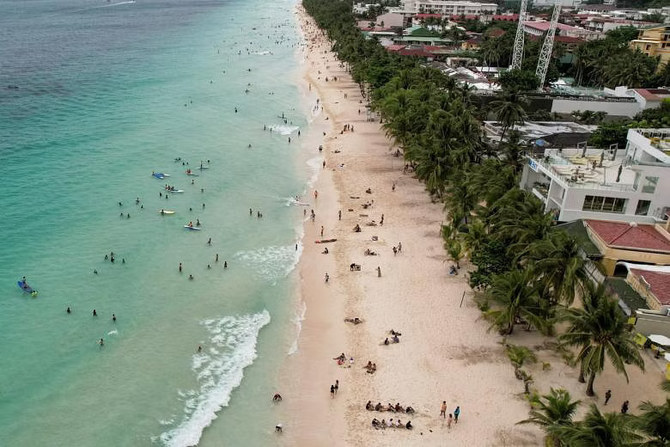
- Philippines has recorded 10 percent increase in visitors arriving from Gulf countries this year
- The country wants to become a preferred destination in Asia and the world
MANILA: The Philippines is working to attract more visitors from the Middle East and position itself as a preferred destination for international travelers, its tourism stakeholders said ahead of the Arabian Travel Market in Dubai.
More than 2,300 exhibitors and delegates from over 165 countries are joining the annual Arabian Travel Market, which this year will take place from May 6 to 9 at the Dubai World Trade Center.
In the Philippines, known for its white sandy beaches, diving spots and diverse culture, tourism is a key sector, contributing nearly 13 percent, or about $44 billion, to its gross domestic product in 2019.
The Department of Tourism will be leading the Philippine delegation in Dubai, as officials set their eyes on promoting the country’s best tourism to the international market.
“We look forward to these opportunities to share the Filipino story to the rest of the world … and to reinforce the Philippines’ position as a preferred destination and top-of-mind choice for travelers,” Secretary of Tourism Christina Garcia Frasco said in a statement.
With its participation at the Arabian Travel Market, the Philippines hopes to sustain the momentum from increased tourist arrivals from the Middle East, she added.
The Philippine tourism industry will not only promote their strengths, such as their tropical and natural attractions, but also diverse offerings in gastronomy and culture, as well as the Filipino tourism workers, “who serve as our best asset for their distinct hospitality and warmth,” Frasco said.
The Philippines has welcomed more 2 million international travelers since the beginning of the year, according to data from the tourism department. This includes a 10 percent increase in visitors arriving from Gulf countries, especially Saudi Arabia and the UAE, which has been among the Philippine government’s key emerging-market targets.
“There’s been a remarkable surge in outbound tourism from the Middle East, particularly from Gulf Cooperation Council countries … We see a growing appetite for international travel among GCC citizens and we see this trend continuing to rise in the coming years,” said Maria Margarita Montemayor Nograles, chief operating officer of the Tourism Promotions Board.
“This is one of the major reasons why we are doubling down on our efforts to maintain and enhance our presence in the Middle East. With our continued participation at the ATM, we aim to position the Philippines as a top-of-mind destination in Asia.”
Tourists from the Middle East are growing more important for some Filipino tourism operators, and represent a significant segment of their clientele, said Manih Karay, president of CTPH Tour.
“To appeal to tourists from Arab countries and promote the Philippines, we highlight the country’s natural beauty, rich cultural heritage, and warm hospitality … Their interest in exploring new destinations and cultural experiences aligns well with our commitment to providing inclusive and diverse travel services,” Karay told Arab News.
Arab tourists also contribute to the growth of the Philippines’ tourism industry, Karay said, adding that they foster cultural exchange and economic development.
“Their visits not only enrich our travel experiences but also promote mutual understanding and appreciation among different cultures,” she said.
Suspected Kashmir rebels kill Indian air force corporal
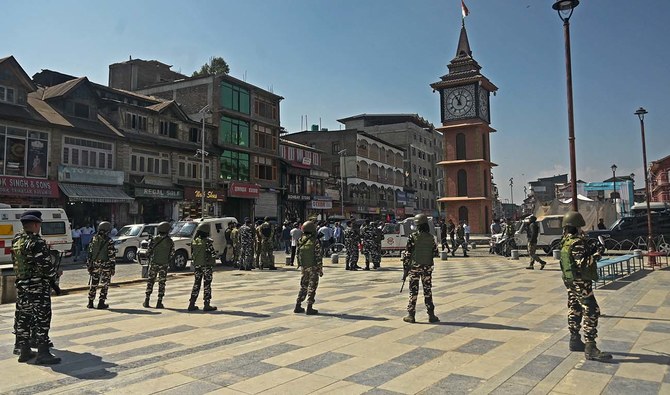
- Suspected rebels ambushed military convoy in Indian-administered Kashmir, Indian Air Force says
- Since 1989, rebel groups opposed to Indian rule have waged insurgency in disputed territory
SRINAGAR, India: An Indian air force member was killed and four more injured when suspected rebels ambushed a military convoy in Indian-administered Kashmir, an official statement said, as campaigning for national elections continues in the disputed territory.
The convoy was attacked by an unknown number of armed militants who sprayed automatic rifle fire toward at least one air force truck in the mountainous Poonch area, 200 kilometers (124 miles) south of the main city of Srinagar, the air force said in a statement.
Five air force personnel were hit in the firefight late Saturday and “one Air Warrior succumbed to his injuries later,” it said, identifying the dead man as a corporal.
A neighboring constituency took part in the first phase of India’s general election on April 19, and Poonch voters were originally scheduled to cast their ballots this week but the Election Commission of India has postponed the polling to May 25 because of inclement weather in recent days.
Kashmir has been divided between India and Pakistan since their independence in 1947, with both claiming the high-altitude territory in full but administering it in parts.
Since 1989, rebel groups opposed to Indian rule have waged an insurgency in Indian-controlled Kashmir, demanding either independence or a merger with Pakistan.
The conflict has left tens of thousands of civilians, soldiers and militants dead.
Rebel activity in the territory has registered an uptick since last month as campaigning for the elections picked up in the restive region.
In April, three suspected rebels were killed and a police officer and three soldiers wounded in three separate clashes across the territory.
Violence has drastically dropped since 2019, when Prime Minister Narendra Modi’s government revoked the region’s limited autonomy and stepped up a security chokehold.
Voting in India’s six-week-long national election, which started last month, will end on June 1.
Driver dies after crashing into White House perimeter gate, Secret Service says

- The driver was not immediately identified
WASHINGTON: A driver died after crashing a vehicle into a gate at the White House Saturday night, authorities said.
The driver was found dead in the vehicle following the crash shortly before 10:30 p.m. at an outer perimeter gate of the White House complex, the US Secret Service said in a statement.
Security protocols were implemented but there was no threat to the White House, the agency said.
The driver was not immediately identified.
The Secret Service will continue to investigate the matter, while turning over the fatal crash portion of the investigation to the Washington Metropolitan Police Department, the agency said.
Fake videos of Modi aides trigger political showdown in India election

- Indian police arrest nine people for circulating fake video of Indian Home Minister Amit Shah
- With more than 800 million Internet users, tackling misinformation in India is a huge challenge
BENGALURU/LUCKNOW: Manipulated videos are taking center stage as campaigning heats up in India’s election, with fake clips involving two top aides of Prime Minister Narendra Modi triggering police investigations and the arrest of some workers of his rival Congress party.
In what has been dubbed as India’s first AI election, Modi said last week fake voices were being used to purportedly show leaders making “statements that we have never even thought of,” calling it a conspiracy “to create tension in society.”
Indian police — already investigating the spread of fake videos showing Bollywood actors criticizing Modi — are now investigating a doctored online clip that showed federal home minister Amit Shah saying the ruling Bharatiya Janata Party will stop certain social guarantees for minorities, a subject sensitive for millions of voters.
Shah retorted on X, posting his “original” and the edited “fake” speech and alleging — without providing any evidence — that the main opposition Congress was behind the video it created to mislead the public. The minister said “directions have been issued to the police to address this issue.”
Indian police arrested at least nine people, including six members of Congress’ social media teams, in the states of Assam, Gujarat, Telangana and New Delhi last week for circulating the fake video, according to police statements.
Five of the Congress workers were released on bail, but the most high-profile arrest made by the cybercrime unit of New Delhi police came on Friday, when they detained a Congress national social media coordinator, Arun Reddy, for sharing the video. New Delhi is one region where Shah’s ministry directly controls police. Reddy has been sent into three-day custody.
The arrest has sparked protests from Congress workers with many posting on X using the #ReleaseArunReddy tag. Congress lawmaker Manickam Tagore said the arrest was an example of “authoritarian misuse of power by the regime.”
Congress’ head of social media, Supriya Shrinate, did not respond to messages and an email seeking comment.
MISINFORMATION
India’s election from April 19 to June 1 will be the world’s largest democratic event. With nearly a billion voters and more than 800 million Internet users, tackling the spread of misinformation is a high stakes job. It involves round-the-clock monitoring by police and election officials who often issue take down orders to Facebook and X as investigations start.
In India’s most populous state of Uttar Pradesh, more than 500 people keep tabs on online content, flagging controversial posts and coordinating with social media companies for their removal when needed, police chief Prashant Kumar told Reuters on Saturday.
Another fake video that sparked a storm last week showed Yogi Adityanath, the state’s chief minister, criticizing Modi for not doing enough for families of those who died in a 2019 militant attack. Though fact checkers said the video was created using different parts of an original clip, state police called it an “AI generated, deepfake.”
Using Internet address tracking, state police arrested a man named Shyam Gupta on May 2 who had shared the fake video post on X a day earlier, receiving over 3,000 views and 11 likes.
The police have accused Gupta of forgery and promoting enmity under Indian law provisions that can carry a jail term of up to seven years if convicted. Reuters could not reach him as he is currently serving a 14-day custody period.
“This person is not a tech guy. Had he been tech savvy, arresting him quickly would not have been possible,” said police officer Kumar.



